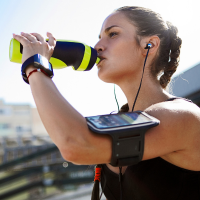Hydration Myths Debunked: What Runners Really Need to Know
When it comes to running, hydration advice can feel overwhelming and, at times, contradictory. Should you drink as much water as possible? Do sports drinks really make a difference? Can you drink too much? Let’s cut through the noise and debunk some of the most common hydration myths with evidence-based recommendations for runners.
 Myth 1: You should drink as much water as possible before and during your run.
Myth 1: You should drink as much water as possible before and during your run.
Truth: More isn’t always better. Overhydrating can dilute the sodium in your blood, leading to a dangerous condition called hyponatremia. Instead of chugging water, aim to drink to quench your thirst. Your body is a pretty good gauge of when it needs fluids.
Tip: Weigh yourself before and after long runs. Losing about 2% of your body weight is considered normal dehydration. If you’re losing more, you might need to increase fluids.
Myth 2: Sports drinks are always necessary.
Truth: For short runs (under an hour), water is usually enough. Sports drinks are most beneficial during longer or high-intensity runs, when you’re losing electrolytes through sweat. They provide sodium, potassium, and carbohydrates that help maintain energy and fluid balance.
Tip: Use sports drinks strategically. Reserve them for runs lasting 90 minutes or more, or in hot and humid conditions.
Myth 3: Caffeine dehydrates you.
Truth: Research shows moderate caffeine intake does not cause significant dehydration. In fact, coffee or tea can count toward your daily fluid intake. For runners, caffeine may even improve performance by increasing focus and reducing perceived exertion.
Tip: If you’re caffeine-sensitive, test its effects in training before race day.
Myth 4: Clear urine means you’re perfectly hydrated.
Truth: While pale yellow urine is a sign of good hydration, clear urine can actually mean you’re over-hydrated. Dark yellow or amber suggests dehydration. But don’t obsess over urine color—it’s just one indicator among many.
Tip: Pay attention to how you feel. Fatigue, dizziness, and headaches can signal dehydration even if your urine looks fine.
Myth 5: Everyone needs the same hydration plan.
Truth: Hydration needs are highly individual and depend on body size, sweat rate, weather, and training intensity. A one-size-fits-all rule doesn’t work.
Tip: Experiment during training to find your balance. Track how much fluid you need on different types of runs and adjust as conditions change.
Evidence-Based Recommendations for Runners
-
Drink for thirst, not a rigid schedule.
-
Use water for runs under an hour; add electrolytes and carbs for longer or hotter sessions.
-
Practice your hydration strategy during training, not just on race day.
-
Be mindful of over-hydration, too much water can be as harmful as too little.
Final Thoughts
Hydration is essential, but the key is balance. Forget the myths that say more water is always better or that only sports drinks count. By listening to your body, practicing during training, and understanding your unique needs, you’ll set yourself up for stronger, safer runs.



